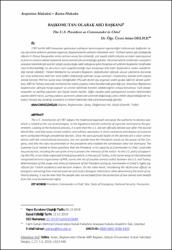Başkomutan Olarak ABD Başkanı
Citation
Delice, Aslan. "Başkomutan Olarak ABD Başkanı". Selçuk Üniversitesi Hukuk Fakültesi Dergisi, 27.3 (2019): 533-549.Abstract
1787 tarihli ABD Anayasası geleneksel yaklaşımı benimseyerek egemenliğin kullanımıyla bağlantılı sa-vaş ilan etme yetkisini yasama organına, başkomutanlık yetkisini hükümete verir. Tarihsel sürece göz atıldığında ülkenin II. Dünya Savaşından sonra resmen savaş ilan etmediği, çok sayıda silahlı çatışma ve askeri operasyonun üç kıta ve onlarca ülkede başkanlık kararnameleriyle yürütüldüğü görülür. Kararnamelerle sürdürülen savaşların anayasa hükümleriyle açık bir çelişki oluşturduğu sabit olduğuna göre Kongreye ait yetkinin başkanlar tarafından nasıl kullanılabildiği, bu durumun niçin engellenmediği veya Anayasayı ihlal eden başkanların neden azledilme-diği merak edilebilir. Yüksek Mahkeme bu sorulara Başkanın, başkomutan sıfatıyla ulusun çıkarlarını korumak için ordu kullanmak dahil her türlü tedbiri alabileceği şeklinde cevap vermiştir. Uluslararası alanda terör örgütü olarak tanınan PKK’nın Suriye kolu niteliğindeki YPG adlı devlet dışı organize silahlı gruba ABD’nin destek politi-kası, ABD ile Türkiye arasında muhtemel bir silahlı çatışma riskini beraberinde getirdiği için, Amerikan Başkanının başkomutan sıfatıyla hangi kapsam ve sınırlar dahilinde hareket edebileceğinin ortaya konulması Türk akade-misyenler ve politika yapıcıları için büyük önemi haizdir. Diğer yandan yetki paylaşımının sınırları belirlenirken yapılan dahili-harici, yurttaş-yabancı ayrımının yabancılar üzerinde doğurduğu yakıcı etkiler düşünüldüğünde hu-kukun himaye dışı bıraktığı insanların en temel haklardan bile yararlanamadığı görülür. The U.S. Constitution of 1787 adopts the traditional approach and gives the authority to declare war, which is related to the use of sovereignty, to the legislature and the authority of supreme command to the gov-ernment. Looking at the historical process, it is seen that the U.S. did not officially declare war after The Second World War, and that many armed conflicts and military operations in three continents and dozens of countries were conducted through presidential decrees. Since the wars pursued based on the decrees are a clear contra-diction with the constitutional provisions, one can wonder how the Presidents could use the power of the Con-gress, and why this was not prevented or the presidents who violated the constitution were not dismissed. The Supreme Court replied to these questions that the President, in his capacity as Commander-in-Chief, could take any precaution, including the use of the army to protect the interests of the nation. As the U.S. policy of support-ing the YPG, a non-State organized armed group which, in the eyes of Turkey, is the Syrian wing of internationally recognized terrorist organization of PKK, carries the risk of possible armed conflict between the U.S. and Turkey, determination of the scope and limits of maneuvre of the President acting as Commander-in-Chief is highly sig-nificant for Turkish academics and decision makers. On the other hand, considering the destructive effects on foreigners stemming from internal-external and citizen-foreigner distinctions while determining the limits of au-thority sharing, it can be seen that the people who are excluded from the protection of law cannot even benefit from the most fundamental rights.



















